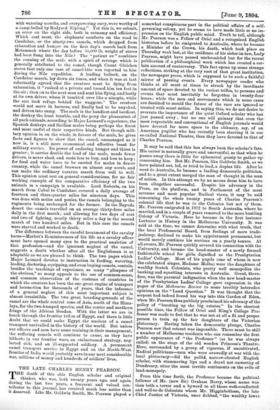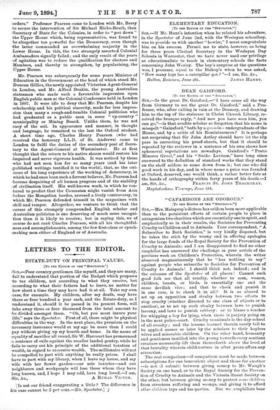THE LATE CHARLES HENRY PEARSON.
THE death of this able English scholar and original thinker, who was, both twenty years ago, and again during the last two years, a frequent and valued con- tributor to this journal, has received much less notice than it deserved. Like Mr. Goldwin Smith, Mr. Pearson played a somewhat conspicuous part in the political affairs of a self- governing colony, yet he seems to have made little or no im- pression on the English public mind. Truth to tell, although Mr. Pearson was a Fellow of Oriel and a recognised English historian before he emigrated to Australia, where he became a Minister of the Crown, his death, which took place on Thursday week last, at the residence of his sister-in-law, Lady Pearson, might have passed unchronicled but for the recent publication of a philosophical work which has created a cer- tain amount of controversy. This fact opens up some strange reflections, striking at the very root of that great institution, the newspaper press, which is supposed to be such a faithful mirror of passing events. Every newspaper reader who thinks at all mast at times be struck by the inordinate amount of space devoted to the veriest trifles, to persons ath events that must inevitably be forgotten in twenty-four hours ; while the men and movements which in some cases are destined to mould the future of the race are ignored or treated with scant notice. In saying this, we do not desire to overrate the importance of the quiet Oxford scholar who has just passed away ; but no one will gainsay that even the- most respectable and conventional of English journals would have devoted far more space to the obituary, say, of an American pugilist who has recently been starring it in our so-called National Theatre, than they have devoted to that of Charles Pearson.
It may be said that this has always been the scholar's fate. His career is naturally grave and uneventful, so that when he passes away there is little for ephemeral gossip to gather up. concerning him. But Mr. Pearson, like Goldwin Smith, as we have pointed out, led, or tried to lead, a duplex life. After he went to Australia, he became a leading democratic politician, and to a great extent merged the man of thought in the man of action. In this attempt we by no means deem him to have- been altogether successful. Despite his advocacy in the- Press, on the platform, and in Parliament of the most extreme and most popular Radical views, it may be said concerning the whole twenty years of Charles Pearson's- colonial life that he was in the Colonies but not of them. Mr. Pearson emigrated in 1872 to South Australia, where he- married, and in a couple of years removed to the more bustling Colony of Victoria. Here he became in the first instance Lecturer in History in the Melbourne University. It was at the time, we cannot determine with what truth, that the local Professorial Board, from feelings of mere trade- jealousy, declined to make his appointment permanent, but would merely continue his services on a yearly tenure. At all events, Mr. Pearson quickly severed his connection with the- University, and became the head-master of a newly formed fashionable school for girls, dignified as the Presbyterian Ladies' College. Most of his pupils (one of whom is now the celebrated singer, Madame Melba) were the daughters of wealthy Scotch Colonists, who pretty well monopolise the banking and squatting interests in Australia. Great, there- fore, was the parental indignation when the new head-master of the Presbyterian Ladies' College gave expression in the pages of the Melbourne Review to some terribly heterodox_ opinions on the "Land Question." It was thought that the- serpent had indeed found his way into this Garden of Eden,. when Mr. Pearson thus- publicly proclaimed his advocacy of the- policy of "bursting up the big estates." In the shortest possible time, the Fellow of Oriel and King's College Pro- fessor was made to feel that he was not at all a fit and proper person to train up the fair daughters of the Victorian. plutocracy. Having taken the democratic plunge, Charles. Pearson saw that retreat was impossible. There must be still a number of Melbourne residents who can remember the first public appearance of "the Professor 2' (as he was always called) on the stage of the old wooden Princess's Theatre. Here, surrounded by a group of vigorous, if uncultivated, Radical politicians—men who were avowedly at war with the- local plutocracy—did the pallid, narrow-chested English scholar, with stammering lips and a drawl not unworthy of Dandreary, utter the most terrific sentiments on the evils of land-monopoly.
From this time forth, the Professor became the political follower of Mr. (now Sir) Graham Berry, whose name was- then both a terror and a byword to all those well-conducted and well-to-do Colonists whom Mr. Higginbotham, the late- Chief Justice of Victoria, once dubbed, "the wealthy lower -orders." Professor Pearson came to London with Mr. Berry to secure the intervention of Sir Michael Hicks-Beach, then Secretary of State for the Colonies, in order to "put down" the Upper House which, being representative, was found • to be altogether too powerful for the Democracy, even though the latter commanded an overwhelming majority in the Lower House. In this, the two strangely assorted Colonial Ambassadors signally failed; and the only result of the years -of agitation was to reduce the qualification for electors and Members, and thereby to strengthen, by popularising, the Upper House.
Mr. Pearson was subsequently for some years Minister of Education in the Government at the head of which stood Mr. Duncan Gillies, the newly appointed Victorian Agent-General in London, and Mr. Alfred Deakin, the young Australian statesman who made such a favourable impression upon English public men at the Colonial Conference held in London in 1887. It were idle to deny that Mr. Pearson, despite his -scholarship and his political sincerity, made far less impres- sion than many a rough-and-tumble Colonial politician who had graduated as a public man in some " up-country " municipality or Mining Board. Unlike them, he was not eau of the soil. In appearance and manner, in thought .and language, he remained to the last the Oxford student. A short time ago, Charles Henry Pearson (who had .received the honorary LL.D. of St. Andrews) came to London to fulfil the duties of the secondary post of Secre- tary to the Agent-General at Westminster. He at first thought that the return to his native shores would restore his impaired and never vigorous health. It was noticed by those who had not seen him for so many years (and his later published writings testified it to the world), that, as the out- -come of his long experience of the working of democracy, in which he had once been such a fervent believer, Mr. Pearson had -become despairing of all human progress and of the stability .-of civilisation itself. His well-known work, in which he ven- tured to predict that the Caucasian might vanish from Asia -before the Mongolian hordes, aroused a lively controversy, in which Mr. Pearson defended himself in the magazines with -skill and temper. Altogether, we venture to think that the -career of this strangely compounded English scholar and Australian politician is one deserving of much more recogni- tion than it is likely to receive; but in saying this, we of -course do not rank Charles Pearson, with all his thoughtful- ness and accomplishments, among the few first-class or epoch- -making men either of England or of Australia.







































 Previous page
Previous page